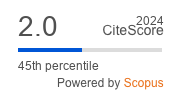Navigating Uncertainty in Innovation Ecosystems
DOI:
https://doi.org/10.23726/cij.2025.1726Keywords:
CIJ, CERN IdeaSquare, CERN, InnovationAbstract
In a world overshadowed by uncertainty, where technologically mediated connectedness can leave us feeling isolated and powerless, it is crucial to recognize that innovation seems our sole response.
References
Amabile, T. (2011). Componential theory of creativity. Harvard Business School Boston, MA.
Beck, S., Bercovitz, J., Bergenholtz, C., Brasseur, T.-M., D’Este, P., Dorn, A., Doser, M., Dosi, C., Effert, A., Furtuna, R., & others. (2021). Experimenting with open innovation in science (OIS) practices: A novel approach to co-developing research proposals. CERN IdeaSquare Journal of Experimental Innovation, 5(2): 28-49. https://doi.org/10.23726/cij.2021.1328
Cetina, K. K. (1999). Epistemic cultures: How the sciences make knowledge. Harvard University Press.
Dosi, C. (2025). Supporting open innovation behaviors in researchers: Developing a training with ACT. CERN IdeaSquare Journal of Experimental Innovation, 9(1): 49-60. https://doi.org/10.23726/cij.2025.1680
Gambi, L. D. N., & Debackere, K. (2025). The importance of an inclusive technology transfer office culture in linking university and industry. CERN IdeaSquare Journal of Experimental Innovation, 9(1): 23-35. https://doi.org/10.23726/cij.2025.1571
Gastrow, M., Utermann, S., Jungstand, A., & Schmoch, U. (2025). Attracting serendipity: The impact of investment at the science/technology interface in fundamental physics research infrastructures. CERN IdeaSquare Journal of Experimental Innovation, 9(1): 36-41. https://doi.org/10.23726/cij.2025.1561
Grigorescu, S., Yordanov, S., Chicoș, L., & Dudek, N. (2025). Exploring the Role of Art in Stimulating Creative Thinking and Problem-Solving within Interdisciplinary STEM-Dominated Student Groups: Insights from Art-Related Activities at CERN IdeaSquare. CERN IdeaSquare Journal of Experimental Innovation, 9(1): 16-22. https://doi.org/10.23726/cij.2025.1486
ISSAIT, I. S.-A. I. team. (2025). The Unbearable Lightness of Uncertainty. CERN IdeaSquare Journal of Experimental Innovation, 9(1): 61-63. https://doi.org/10.23726/cij.2024.1583
Kruse Chandra, L. (2025). Design Principles Unveiled: Capturing Design Knowledge from Design Science Research. CERN IdeaSquare Journal of Experimental Innovation, 9(1): 5-8. https://doi.org/10.23726/cij.2025.1582
Paez Franco J. (2025). Social environment stimuli management to foster creativeness and innovative thinking among teams. CERN IdeaSquare Journal of Experimental Innovation, 9(1): 9-15. https://doi.org/10.23726/cij.2025.1485
Pujol Priego, L., Wareham, J., & Romasanta, A. K. S. (2022). The puzzle of sharing scientific data. Industry and Innovation, 29(2), 219–250.
Rheinberger, H.-J. (1997). Toward a history of epistemic things: Synthesizing proteins in the test tube. Stanford University Press.
Romasanta, A. K., Ahmadova, G., & Wareham, J. (2025). The Impact of Research Data Infrastructures: The Case of the AlphaFold Database. CERN IdeaSquare Journal of Experimental Innovation, 9(1): 42-48. https://doi.org/10.23726/cij.2025.1597
Vignoli, M., Mattarelli, E., & Mäkinen, S. (2018). Experimenting with innovation in creative spaces. CERN IdeaSquare Journal of Experimental Innovation, 2(1), 1. https://doi.org/10.23726/cij.2018.797
Vignoli, M., & Wareham, J. (2024). Research in action to push the boundaries of scientific research and technological development. CERN IdeaSquare Journal of Experimental Innovation, 8(1), 1–4. https://doi.org/10.23726/cij.2024.1530
Wareham, J., Priego, L. P., Romasanta, A. K., Mathiassen, T. W., Nordberg, M., & Tello, P. G. (2022). Systematizing serendipity for big science infrastructures: The ATTRACT project. Technovation, 116, 102374.
Wareham, J., Fox, P. B., & Giner, J. L. C. (2014). Technology Ecosystem Governance. Organization Science, 25(4), 1195–1215. http://www.jstor.org/stable/43660930
Downloads
Published
How to Cite
License
Copyright (c) 2025 Matteo Vignoli, Jonathan Wareham

This work is licensed under a Creative Commons Attribution 4.0 International License.
Authors who publish with this journal agree to the following terms:
- Authors retain copyright and grant the journal right of first publication with the work simultaneously licensed under a Creative Commons Attribution License that allows others to share the work with an acknowledgement of the work's authorship and initial publication in this journal.
- Authors are able to enter into separate, additional contractual arrangements for the non-exclusive distribution of the journal's published version of the work (e.g., post it to an institutional repository or publish it in a book), with an acknowledgement of its initial publication in this journal.
- Authors are permitted and encouraged to post their work online (e.g., in institutional repositories or on their website) prior to and during the submission process, as it can lead to productive exchanges, as well as earlier and greater citation of published work (See The Effect of Open Access).


